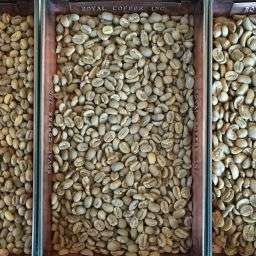
Arabian coffee beans, primarily known as Arabica beans, hold a pivotal place in both history and culture. Originating from Ethiopia, Arabica beans have been cherished for their superior flavor and quality for centuries.
The first written records of coffee made from these beans trace back to Arab scholars, who highlighted its utility in prolonging work hours. The cultivation and enjoyment of coffee then spread from Yemen to Egypt, Turkey, and beyond, making its mark around the globe.
The significance of Arabian coffee extends far beyond its consumption. In Arab culture, it symbolizes hospitality, respect, and tradition, often served in homes and at gatherings with great ceremony.
This deep-rooted cultural significance underlines the unique position Arabian coffee holds, not just in the Middle East but also worldwide as a symbol of unity and heritage.
History and Cultivation
Arabica coffee beans, accounting for 60% of global coffee production, have a rich history tied to their discovery and spread. The beans were first cultivated in the Arabian Peninsula, specifically Yemen, before spreading across the world.
Cultivation practices and preferred regions have evolved, with Arabica beans now thriving in high-altitude areas of Central and South America, Africa, and Asia.
These beans mature over approximately seven years, flourishing in climates with 1.0–1.5 meters of annual rainfall and temperatures between 15 and 24°C.
Characteristics of Arabica Beans
Arabica beans are celebrated for their bright, fruity, and slightly wine-like flavor, setting them apart from other coffee species, such as Robusta. These beans have a balanced flavor and lower acidity, attributed to their genetic makeup and cultivation conditions.
Arabica plants are also known for their susceptibility to pests and diseases, requiring more careful management compared to the hardier Robusta species. The diversity of Arabica coffee is vast, with over 50 varieties like Typica, Bourbon, and Geisha, each offering unique flavor profiles ranging from sweet and soft to tea-like and floral.
In comparing Arabica to Robusta, Arabica beans are favored for their smoother, more complex flavors, whereas Robusta beans are known for their stronger, more bitter taste and higher caffeine content. This distinction plays a crucial role in the coffee’s final taste and quality, making Arabica beans the preferred choice for consumers seeking a more refined coffee experience.
Processing Methods and Their Impact on Flavor
The flavor and aroma of Arabica coffee beans are profoundly influenced by their processing methods: dry, wet, and wet-hulling. Dry processing, also known as natural processing, involves drying the whole cherry in the sun, resulting in a sweet, slightly fermented flavor profile.
Wet processing washes away the cherry and mucilage before drying, leading to a cleaner, more pronounced flavor. Wet-hulling, a method commonly used in Indonesia, creates earthy-flavored coffees with a distinctive body and lower acidity.
Roasting Arabica Beans
Roasting Arabica beans transforms their chemical and physical properties, significantly affecting the flavor profile of the coffee. Lighter roasts preserve the bean’s original flavor, highlighting its acidity and complexity, ideal for revealing the bean’s inherent characteristics.
Darker roasts reduce acidity, emphasizing a sweeter yet bitter taste, often preferred for their robust flavor. The preferred roast for Arabian coffee leans towards lighter roasts, which allows the nuanced flavors and aromas of high-quality Arabica beans to shine, complementing the traditional spices used in Arabian coffee preparations.
Preparation and Traditions of Arabian Coffee
Arabian coffee, known for its distinctive preparation methods and equipment, such as the dallah and cezve, is deeply embedded in tradition. The brewing process often involves roasting beans to a light degree and grinding them finely before simmering in water along with cardamom, a spice essential for its signature flavor.
This method yields a coffee that is not just a drink but a celebration of hospitality and culture. Serving Arabian coffee is a ceremonial process, symbolizing respect and community, often accompanied by dates or sweets.
The inclusion of cardamom not only adds a unique flavor but also reflects the rich culinary heritage of the Arab world, making each cup a tribute to centuries-old traditions.
Health Benefits and Concerns
Arabica coffee, renowned for its taste and quality, also comes with a range of health benefits and concerns. The high antioxidant levels in Arabica beans can reduce the risk of certain types of cancer and have been linked to lower rates of heart arrhythmias and bacterial infections.
However, it’s important to note the presence of compounds like kahweol and cafestol, which are associated with increased levels of bad cholesterol and liver enzymes when coffee is unfiltered. These compounds highlight the importance of moderation and preparation method in consuming coffee to mitigate potential health risks.
FAQs
Differences between Arabica and Regular Coffee
Arabica coffee is often considered synonymous with “regular” coffee due to its widespread cultivation. It is prized for its sweet, smooth taste with hints of fruit and chocolate, distinct from the stronger, more bitter flavor of Robusta, another common coffee type. Arabica contains less caffeine than Robusta, making it a preferred choice for those sensitive to caffeine.
Best Roast Levels for Arabica Beans
The best roast level for Arabica beans typically falls into the medium range, balancing acidity and body without overshadowing the bean’s natural flavors. Medium roasts allow the caramelization process to begin, offering a harmonious blend of sharp, acidic, and sweet, smoky notes.
Caffeine Content in Arabica Coffee
Arabica coffee generally contains less caffeine compared to Robusta coffee, with approximately 34.1 to 38.5 grams of caffeine per kilogram. This lower caffeine content contributes to Arabica’s smoother taste compared to the more caffeinated and bitter Robusta beans.
Final Thoughts
Arabian coffee beans, particularly Arabica, hold a cherished place in both the history of coffee and contemporary culture. Known for their superior flavor, these beans embody a rich tapestry of tradition, from cultivation to the ceremonial serving.
The future of Arabian coffee sees a continued appreciation for its unique characteristics, with a growing interest in sustainable cultivation practices and the exploration of new varieties.
As consumers become more informed, the demand for quality, transparency, and ethical sourcing in coffee production is likely to increase, shaping the future landscape of Arabian coffee consumption and cultivation.








